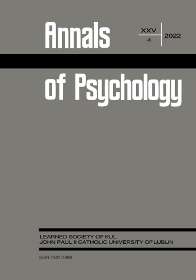Introduction to the Special Issue Closer to Emotions
Abstrakt
This special issue of the Annals of Psychology is dedicated to emotions. Despite many years of research on emotions, there are still many areas that require intensive scientific work. New questions and research problems emerge very distinctly when we are dealing with a dynamically changing reality in which we have to function, and no doubt this is what we are dealing with at the moment. This special issue contains articles on emotions, in which the authors—participants of the current and previous editions of the International Scientific Conference Closer to Emotions—adopt different theoretical perspectives and use different research paradigms to show the importance of emotions in various spheres of life. This multi-dimensional perspective corresponds to a wide spectrum of using psychological knowledge from the field of emotions in the modern world.
Bibliografia
Ajzen, I. (1991). The theory of planned behavior. Organizational Behavior and Human Decision Processes, 50(2), 179–211. https://doi.org/10.1016/0749-5978(91)90020-T
Cudo, A., Torój, M., Misiuro, T., & Griffiths, M. T. (2020). Problematic Facebook use and problematic video gaming among female and male gamers. Cyberpsychology Behavior and Social Networking, 23(2), 126–133. https://doi.org/10.1089/cyber.2019.0252
Ekman, P. (2007). Emotions revealed. Recognizing faces and feelings to improve communication and emotional life. Henry Holt and Co.
Li, Z., Farmanesh, P., Kirikkaleli, D., & Itani, R. (2022). A comparative analysis of COVID-19 and global financial crises: Evidence from US economy. Economic Research-Ekonomska Istraživanja, 35(1), 2427–2441. https://doi.org/10.1080/1331677X.2021.1952640
Ortony, A. (2022). Are all “basic emotions” emotions? A problem for the (basic) emotions construct. Perspectives on Psychological Science, 17(1), 41–61. https://doi.org/10.1177/1745691620985415
Shevlin, M., Hyland, P., & Karatzias, T. (2022). The psychological consequences of the Ukraine war: What we know, and what we have to learn. Acta Psychiatrica Scandinavica, 146(2), 105–106. https://doi.org/10.1111/acps.13466
Tausch, A., Souza, R. O., Viciana, C. M., Cayetano, C., Barbosa, J., & Hennis, A. J. (2022). Strengthening mental health responses to COVID-19 in the Americas: A health policy analysis and recommendations. The Lancet Regional Health – Americas, 5, 100118. https://doi.org/10.1016/j.lana.2021.100118
Zaleski, Z. (2007). Emocje wyzwaniem naszych czasów. Wprowadzenie [Emotions as a challenge of our time. An introduction]. In A. Błachnio & A. Gózik (Eds.), Bliżej emocji [Closer to emotions] (pp. 5–6). Wydawnictwo KUL.
Żyżniewski, D. J. (2019). Emocje i nastrój [Emotions and mood]. Wydawnictwo Zwierciadło.
Copyright (c) 2022 Annals of Psychology

Utwór dostępny jest na licencji Creative Commons Uznanie autorstwa – Użycie niekomercyjne – Bez utworów zależnych 4.0 Międzynarodowe.


